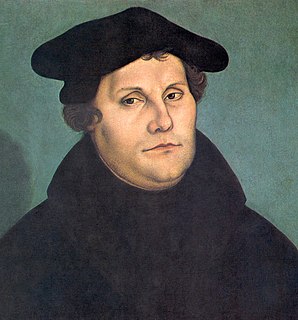
Johann Tetzel was a German Dominican friar and preacher. He was appointed Inquisitor for Poland and Saxony, later becoming the Grand Commissioner for indulgences in Germany. Tetzel was known for granting indulgences on behalf of the Roman Catholic Church in exchange for money, which are claimed to allow a remission of temporal punishment due to sin, the guilt of which has been forgiven, a position heavily challenged by Martin Luther. This contributed in part to the Reformation.

The Archbishopric of Magdeburg was a Roman Catholic archdiocese (969–1552) and Prince-Archbishopric (1180–1680) of the Holy Roman Empire centered on the city of Magdeburg on the Elbe River.

Johann Cochlaeus (Cochläus) was a German humanist, music theorist, and controversialist.
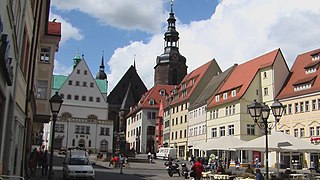
Eisleben is a town in Saxony-Anhalt, Germany. It is famous as the hometown of Martin Luther; hence, its official name is Lutherstadt Eisleben. As of 2015, Eisleben had a population of 24,198. It lies on the Halle–Kassel railway.

Baron Clemens August von Droste zu Vischering, German Clemens August Freiherr von Droste zu Vischering was an Archbishop of Cologne. His clashes with the Prussian government personified the conflict relationship between the Catholic Church and the Prussian-Protestant state power in the 19th century Germany.
Johann Dietenberger was a German Catholic Scholastic theologian.
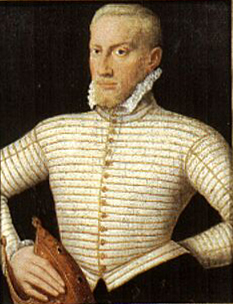
Gebhard Truchsess von Waldburg was Archbishop-Elector of Cologne. After pursuing an ecclesiastical career, he won a close election in the Cathedral chapter of Cologne over Ernst of Bavaria. After his election, he fell in love with and later married Agnes von Mansfeld-Eisleben, a Protestant Canoness at the Abbey of Gerresheim. His conversion to Calvinism and announcement of religious parity in the Electorate triggered the Cologne War.
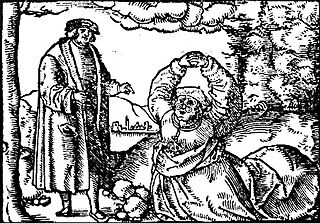
Johannes (Josef) Pfefferkorn (1469–1523) was a German Catholic theologian and writer who converted from Judaism. Pfefferkorn actively preached against the Jews and attempted to destroy copies of the Talmud, and engaged in a long running pamphleteering battle with humanist Johann Reuchlin.
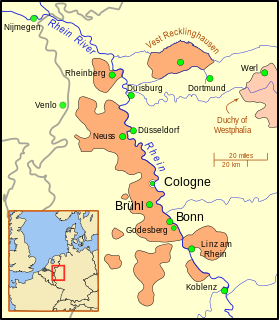
Vest Recklinghausen was an ecclesiastical territory in the Holy Roman Empire, located in the center of today's North Rhine-Westphalia. The rivers Emscher and Lippe formed the border with the County of Mark and Essen Abbey in the south, and to the Bishopric of Münster in the north. In the east, a fortification secured the border with Dortmund and in the west it was bordered by the Duchy of Cleves.

Johann Host von Romberch was a German Dominican, and writer.
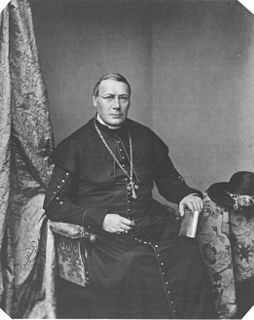
Archbishop Gregor Leonhard Andreas von Scherr, OSB was Archbishop of Munich and Freising from 1856 until 1877.

Johannes von Geissel was a German Catholic Archbishop of Cologne and Cardinal from the Electorate of the Palatinate.

The Archdiocese of Cologne is an archdiocese of the Catholic Church in western North Rhine-Westphalia and northern Rhineland-Palatinate in Germany.

Karl von Mansfeld was a German general during the Cologne War and the Ottoman-Habsburg wars.
The Congress of Ems was a meeting set up by the four prince-archbishops of the Holy Roman Empire, and held in August 1786 at Bad Ems in the Electorate of Trier. Its object was to protest against papal interference in the exercise of episcopal powers, and to fix the future relations between the participating archbishops and the pope. Representatives of the three elector-archbishops: Friedrich Karl von Erthal of Mainz, Maximilian Franz of Cologne, Clemens Wenceslaus of Trier, as well as of Prince-Archbishop Hieronymus von Colloredo of Salzburg took part.
Adrian and Peter von Walenburch (born at Rotterdam were both auxiliary bishops of Cologne, and Dutch Roman Catholic controversial theologians.

The Cologne War (1583–88) was a conflict between Protestant and Catholic factions that devastated the Electorate of Cologne, a historical ecclesiastical principality of the Holy Roman Empire, within present-day North Rhine-Westphalia, in Germany. The war occurred within the context of the Protestant Reformation in Germany and the subsequent Counter-Reformation, and concurrently with the Dutch Revolt and the French Wars of Religion.

Agnes von Mansfeld-Eisleben (1551–1637) was Countess of Mansfeld and the daughter of Johann (Hans) Georg I, of Mansfeld Eisleben. She converted Gebhard, Seneschal of Waldburg, the Prince-Elector of Electorate of Cologne and archbishop of the Diocese of Cologne to the Protestant faith, leading to the Cologne War (1583–1588).

The House of Mansfeld was a princely German house, which took its name from the town of Mansfeld in the present-day state of Saxony-Anhalt. Mansfelds were archbishops, generals, supporters as well as opponents of Martin Luther, and Habsburg administrators.

Margrave James III of Baden-Hachberg was margrave of Baden-Hachberg from 1584 to 1590 and resided at Emmendingen. He converted, in 1590, from Lutheranism to the Roman Catholic confession, causing some political turmoil.




